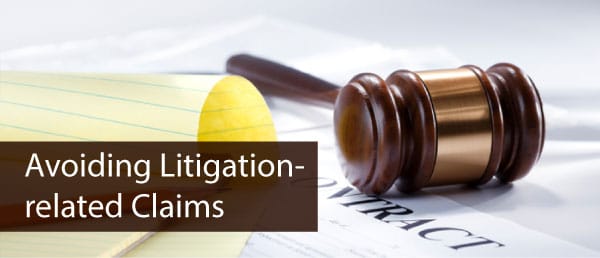
Avoiding Litigation-related Claims
Litigation-related Claims
Litigation errors breed the largest number of malpractice claims reported each year. In recent years, errors arising out of litigation accounted for nearly 36% of all reported claims. In the vast majority of cases, the statute of limitation on the client’s case expired and there was nothing left to do but assess the damages.
Below are the top three errors that lead to malpractice claims for attorneys.
FAILING TO MAINTAIN A COMPREHENSIVE CALENDARING/DOCKET CONTROL SYSTEM
Lawyers miss deadlines for a variety of reasons, but the most common is the lack of a good calendaring and docket control system. It does not matter whether you use a computerized case management and calendaring system or an old-fashioned tickler box. The most important aspects of a good docket control system are that (a) all relevant dates, whether they be statutes of limitation, appointments, or discovery deadlines be entered into the system and (b) several advance warnings of each deadline be given to the attorney and support persons involved.
WAITING UNTIL THE LAST MINUTE TO FILE THE COMPLAINT
One of the biggest mistakes that leads to malpractice suits is the tendency for the plaintiff’s lawyer to file a complaint at the eleventh hour – on the eve of the statute of limitation deadline. Although the lawyer believes he is within the “safety zone” because the limitation period has not yet expired, filing at the last minute is often a risky practice. In many cases, the plaintiff’s lawyer may be unable to perfect service of the summons and must file an alias and pluries summons to keep the action alive.
Sometimes the lawyer and/or his support staff forget to calendar the date the original summons expires. As a result, the action is barred because the statute of limitation expires before the summons is renewed. Other times, the lawyer inadvertently names the wrong defendant, and the opposing party files a motion to dismiss on that basis. If the complaint is filed at the last minute, the lawyer has little or no time left to investigate and determine the name of the proper party before the deadline passes.
For these reasons, we strongly encourage plaintiffs’ attorneys to file the complaint well in advance of the statute of limitation deadline. Filing early will give you more time to fix mistakes such as improper service or naming the wrong party. Hopefully, this extra time will give you an opportunity to correct mistakes before a malpractice claim develops.
FAILING TO KNOW THE CORRECT STATUTE OF LIMITATION
Sometimes, even with proper docket control systems, the lawyer fails to determine the correct statute of limitation applicable to the case. As different jurisdictions and types of cases all have different time frames, it’s important to verify the applicable statute of limitation.
